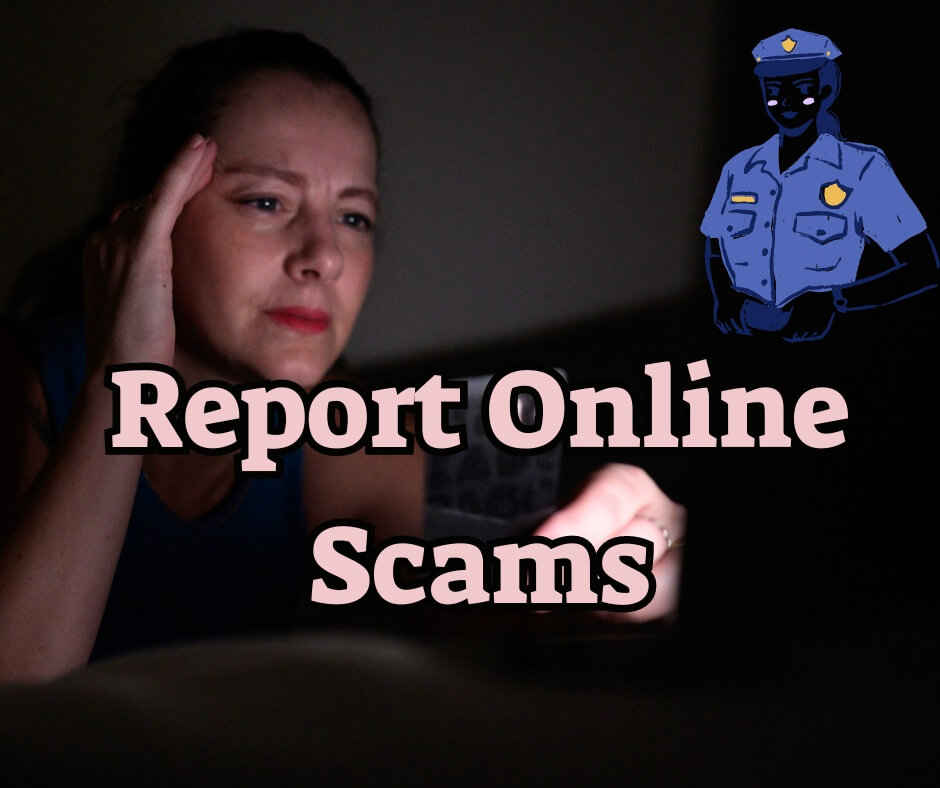As the digital world continues to expand, it has created numerous opportunities for people worldwide. However, this growth has also increased cybercrime, particularly online scams. These scams range from phishing emails, and fake tech support calls, to fraudulent e-commerce sites. As such, it is important to know how to report online scams and help reduce their prevalence.

Before we delve into how to report online scams, it’s crucial to understand what they are and how they operate. Online scams are fraudulent schemes that trick individuals into giving away sensitive information, money, or both. These scams often appear authentic, taking the form of genuine emails, text messages, calls, or websites. Scammers usually masquerade as trustworthy entities, such as banks, tech companies, or government agencies, to convince their targets to part with their information or money.
Scammers are continually evolving and developing new ways to deceive their victims, making it all the more important for everyone to be vigilant and stay up-to-date with the latest scam trends.
If you have fallen victim to an online scam or have identified a potential scam, it is important to report it. By reporting online scams, you aid in curbing cybercrime and potentially save others from becoming victims.
If the scam involved any financial transactions, the first step should be to contact your bank or credit card company. They can help secure your accounts, reverse fraudulent charges, and provide you with information on how to report the scam.
The next step to report online scams is contacting your local law enforcement. This might seem like an extreme step, but online scams are serious criminal offenses. Providing the authorities with information can help them track down the culprits.
If the scam occurred on a specific platform (like a social media site, e-commerce platform, or email service), you should report the incident to the relevant platform. They can take steps to shut down the scammer’s account, preventing further fraudulent activity.
In the U.S., you can report online scams to the Federal Trade Commission (FTC) via their website.
In the UK, you can report to Action Fraud, the national reporting center for fraud and cybercrime.
Other countries also have their respective cybercrime reporting centers.
For victims in the U.S., the IC3 is a partnership between the FBI and the National White Collar Crime Center, designed to address cybercrime. Submitting a complaint here can provide law enforcement with valuable data to track down cybercriminals.
Given the anonymous nature of cryptocurrency transactions, tracing them can be a challenging task. This is where cybersecurity firms, such as CNC Intelligence, specializing in crypto transactions come into the picture. These firms use cutting-edge technologies and methodologies to track, trace, and potentially recover stolen crypto assets, making them valuable allies in the fight against online scams.
Cryptocurrency-related scams have been on the rise, with fraudsters often demanding payment in Bitcoin or other cryptocurrencies due to the perceived anonymity these platforms offer. However, specialized cybersecurity firms have developed sophisticated tools to de-anonymize blockchain transactions and trace funds to specific wallets.
By working with these firms, victims of online scams have an increased chance of recovering their stolen funds. Additionally, these firms can provide crucial evidence and intelligence to law enforcement agencies, assisting in the successful prosecution of the cybercriminals involved.
Moreover, they can work closely with law firms, providing the necessary technical expertise to pursue legal recourse. Their detailed reports can support a victim’s case, improving the likelihood of a favorable outcome.
In essence, a cybersecurity firm specializing in crypto transactions not only aids in immediate scam recovery efforts but also plays a critical role in the larger fight against online scams and cybercrime. Their expertise and capabilities are indispensable in the ever-evolving world of digital currencies.
Knowing how to report online scams is just half the battle. Equally important is learning how to protect yourself from falling victim to these scams in the first place. Here are some tips:
In conclusion, the threat of online scams is a growing concern in today’s digital age. But by being vigilant, understanding how these scams operate, knowing how to report online scams, and taking preventative measures, you can help make the Internet a safer place for everyone.
If you are a victim of online scams, please let us know by commenting below and if you have lost a significant amount of money, do not lose hope. We can help you recover your funds!

I am a victim of a romance scam and I lost more than $400K in 4 years.
Hi Gennaro,
Thank you for reaching out and sharing your experience. We’re deeply sorry to hear about the substantial losses you’ve faced due to this romance scam. These situations can be emotionally and financially devastating, and it’s crucial to take steps toward recovering from them.
We recommend documenting all communications, financial transactions, and any details you have about the scam. If you’re interested, our team can offer a free consultation to discuss potential next steps for tracing your funds or pursuing legal options. You can contact us at https://reportyourscam.com/cryptocurrency-tracing-by-cnc-intelligence/.
Please know you’re not alone, and there are resources available to help.
Best regards,
Ben from ReportYourScam.com
I have read all this and it’s unfortunate that this is what online is about today and how Scammers can just feel free to Do as they please. I’m a Victim of Scammers and Stolen Identity myself most recently.
Hi Karen, thank you for sharing your experience. We’re sorry to hear about your situation. If you’d like assistance or guidance on how to report or recover from scams, feel free to reach out or visit https://reportyourscam.com/cryptocurrency-tracing-by-cnc-intelligence/ for more information. You’re not alone in this, and support is available.
i am MAKI MOHAMAD my problem abaut to my encrypted card from fraud my card is fully paid up to three years at free charge to update so now my problem i m not use to my card because no payment to any store online at to personal my card is always receive balance three year paid no payment to any store
Dear MAKI MOHAMAD,
Thank you for sharing your concerns with us at ReportYourScam.com. We understand you are experiencing difficulties with your encrypted card, which you have stated is fully paid for three years but is not functioning for online or personal store transactions.
To better assist you, we would need a bit more information about the specific issues you are facing. Could you please clarify the following:
1. The Name of the Card Issuer: Who is the company or financial institution that issued your encrypted card?
2. Details of the Fraud: What exactly happened when you say the card is from ‘fraud’? Was the card sold to you under misleading conditions, or did you experience fraudulent transactions on the card?
3. Communication with the Card Provider: Have you contacted the issuer of the card about these issues? If so, what response did you receive?
4. Proof of Payment and Terms of Service: Do you have proof of payment for the three-year service and a copy of the terms of service or agreement you had with the card provider?
5. Specific Problems in Usage: Could you provide more details about what happens when you try to use the card? Are there error messages or declines that occur?
Once we have more information, we can offer more targeted advice. In the meantime, here are some general suggestions:
– Contact the Card Issuer: If you haven’t already, reach out to the card issuer immediately to report the problem and seek a resolution.
– Report to Financial Authorities: If you suspect fraud or misleading practices, report the issue to your local financial regulatory authority or consumer protection agency.
– Secure Your Financial Information: Be cautious and monitor your financial accounts for any unauthorized activity, especially if you suspect your card details might be compromised.
– Collect and Preserve Evidence: Keep all correspondence, agreements, and transaction records related to this issue, as they can be crucial in resolving the matter.
i am MAKI MOHAMAD my problem abaut to my encrypted card my card is a fully paid up to trears at free charge with new code so now my problem is i m not use to my card because i m not payment to online store or personal store at my loking to my card is my charge to update update is free now i m not use to my card threars paid i no use my card
I was sent a package by ruby royal logistics in new York may 8th,still have not received my package because scams got involved somehow,they constantly asking for money through Bitcoin address,along with the manager and somehow my package has been in SC supposedly at the USPS, US Custom and Protection is involved,just crooked people and still no package!
Hello and thank you for sharing your experience. I’m really sorry to hear that you’ve encountered such difficulties with your package and the involvement of various suspicious activities around it.
Given the nature of your situation where scams seem to have infiltrated the delivery process and the constant requests for Bitcoin payments, this appears to be a case intertwined with fraudulent activities, potentially involving cryptocurrency.
Firstly, it might be beneficial to report this incident to local law enforcement and relevant federal agencies such as the Federal Trade Commission (FTC) or the Internet Crime Complaint Center (IC3), which specialize in handling online scam and fraud cases.
For the cryptocurrency aspect, since it appears there’s a constant demand for Bitcoin payments, it might be helpful to involve specialists in cryptocurrency tracing like CNC Intelligence. CNC Intelligence can assist in tracking the movement of cryptocurrencies involved in this incident, providing necessary evidence that could be used by law enforcement or legal professionals in subsequent recovery efforts.
Remember, you’re not alone in this; organizations and specialists are available and well-equipped to offer guidance and support in handling such challenging situations. If the loss due to this scam involves a substantial amount, especially over $5000 in cryptocurrency, feel free to seek a specialized consultation to explore the available options for your case.
Please ensure all the communications, payment requests, and other details related to this case are well-documented, as they can serve as essential pieces of evidence in the investigation process. Stay strong, and don’t lose hope; assistance is available to navigate through this ordeal.
My Facebook account has been hacked, they are trying to get people to invest in bitcoin. It has been reported several times to Facebook, but the scammer continues this in my name. My Facebook name is Roxanne Moore Lepper. My name is Roxanne Lepper. Email address is ********@gmail.com. Phone 573-***-****. Please help stop this person. Thank you
Dear Roxanne,
We’re really sorry to hear about your situation. Thank you for alerting us. We highly recommend you take immediate steps like changing your passwords and enabling two-factor authentication.
As we’re not equipped to directly handle account hacks, it’s crucial that you report this issue to Facebook’s support and your local authorities. If you lost a significant amount of money, our partnered tracing company may be able to assist you.
Could you please provide more details through private channels for confidentiality and security?
I’m completely locked out of my account. Have contacted police department and was told they can’t help, told to contact you. Have contacted as many people as I can to tell them. Facebook has been notified several times.
Dear Roxanne,
I’m really sorry to hear that you’re experiencing this frustrating and alarming situation. While we’re not equipped to directly intervene with Facebook accounts, we recommend persisting with Facebook’s support to regain control of your account.
You might also consider seeking advice from cybersecurity experts who specialize in these matters. You’ve done well to notify the police and your contacts; the more people are aware, the less harm the scammer can do.
Wishing you a swift resolution to this issue.